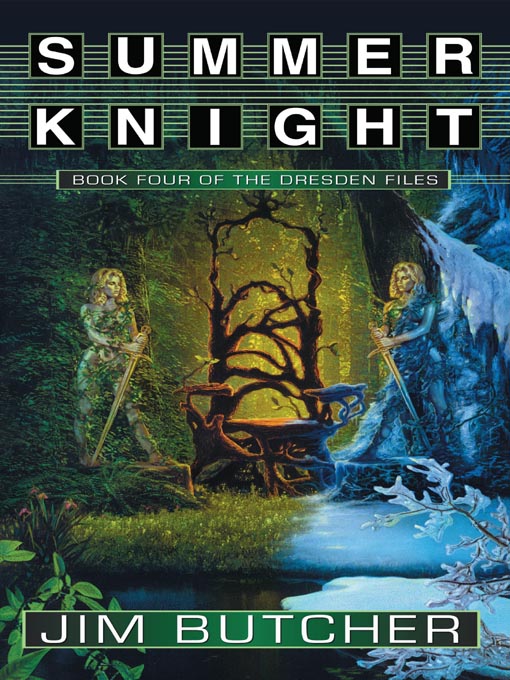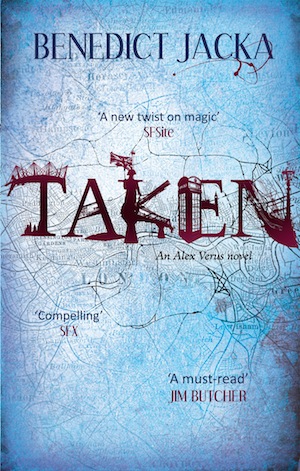Alex Verus is the star of an urban fantasy series of novels by Benedict Jacka, each titled with a past participle. So far there are five books: Fated, Chosen, Cursed, Taken and Hidden. Alex Verus is a wizard living in contemporary London, specifically Camden, who runs a shop selling magical doodads and doesn't really have any friends. He also has problems with authority. Despite his desire for a quiet life, Verus constantly gets embroiled in magical disputes, often as a result of the exploits of his sort-of apprentice Luna, mostly involving a Bad Guy of some flavour who is trying to kill him, forcing Verus to unleash wholesale destruction on Bad Guy and Evil Associates alike. I started reading the Alex Verus novels because Jacka (or his unnamed minion) writes a mean synopsis. Also, Fated was on sale, so I got it for 99p. As I read the novels, I became increasingly confused by the fact that the first review for every single one was by a guy called Jim Butcher, who smugly informed me that 'Harry Dresden would like Alex Verus tremendously - and be a little nervous around him.' Who is Harry Dresden? I thought, and, as the marketing staff of Amazon had intended (I imagined them secretly watching me, gleefully rubbing their hands/tentacles together), I googled him.
Harry Dresden is the star of an urban fantasy series of novels by Jim Butcher, each titled with a two-
word pun. There are fourteen books so far, so I won't list all the titles; the first four are Storm Front, Fool Moon, Grave Peril and Summer Knight. Harry Dresden is a wizard living in contemporary Chicago, who runs a one-man wizard detective agency, concocts and creates magical doodads in his basement (with the help of an animated skull) and doesn't really have any friends. He also has problems with authority. Notice any similarities? One difference is that in Dresden's case, at least in the first few novels, it is not his personal attachments that lead him into trouble, but his need for cash - he starts most novels on the brink of bankruptcy, and wheedles consultant work out of the Chicago Police Department to keep himself afloat, which somehow always results in him saving the world from definite destruction. But both Dresden and Verus function in similar ways in their narratives: they are Unconventional, they are Mavericks, they Get Things Done and they are Manly Men.

One of the things I find particularly entertaining when reading the Dresden Files is that I get the feeling the books are addressed explicitly to a male reader, in much the same way that Twilight or The Hunger Games are directed at girls. While the reader is expected to relate to Dresden's various heroic activities, and Butcher does a decent job of making him both admirable and vulnerable, the books exude an expectation of heterosexual maleness with regard to the reader. As a woman, this creates moments of cognitive dissonance for me. For example, Dresden often says that in defiance of women's status as independent subjects, he still has a chivalrous, protective urge hardwired into his very being that leads him to try and defend women, and forget the consequences. One cannot help but feel that this is addressing a male heterosexual reader who is expected to relate to Dresden, while women should want to sleep with him, because he is oh-so-sexy in his leather duster and frankly bizarre hat. As a result, in defiance of authorial intention, I experience a gleeful sort of schadenfeude when women fail to be swayed by Dresden's last-knight-of-the-round-table act, show up at the location of the novel's climactic showdown, and screw everything up. Of course, it is disturbing that a series of novels written in the twenty-first century should peddle the notion that weak women should stay out of things, otherwise people will get hurt. Especially in the case of Susan. Susan is a cretin. But it is hard to take offence; after all, this is a series of novels about a sleuthing wizard in Chicago. There is a limit to how seriously one can take them.
 Like Dresden, Verus is presented as a character men should want to be and women should want to bed (though he has a kind of rubbish sex life, and his only meaningful emotional attachment for most of his life has been to a gargantuan talking spider). Indeed, both Butcher and Jacka seem to create characters who function to some extent as wish-fulfilment: Butcher's Harry Dresden is a geeky, slightly strange misfit, but he turns out to be right all the time, and his enemies routinely have to eat their words, either because they turn out to have been wrong about him, or because he has set them on fire. Verus is also a somewhat strange misfit who is weaker than his enemies, but somehow always prevails in the end. This character structure actually causes Jacka some problems as the series progresses: in the first two books, Verus grows from a sarcastic, solitary misanthrope into a rounded person with life experience, as he gradually faces the traumas of his past (inflicted upon him by the hilariously named supervillain Richard Drakh) and learns to play with the other children. By the end of book two, Jacka is faced with a problem: Verus has started to get his act together. He's not really a loner, he's not really a misanthrope, and he's already killed most of the people who were trying to kill him. This leaves little cause for adventure, and raises the dreadful possibility that Verus will settle down with Luna and pop out some perfect yet cursed babies. Jacka averts this development in book three by broadening Verus' world. Luna becomes Verus' apprentice, which forces him to engage with the Light Council, because Luna has to attend a training program. This introduces new characters, and a whole new range of parameters affecting Verus' life and relationships, enabling Jacka to maintain the narrative tension. It also helps that the mystery at the centre of the novel is engaging, unpredictable, and features a creepy villain.
Like Dresden, Verus is presented as a character men should want to be and women should want to bed (though he has a kind of rubbish sex life, and his only meaningful emotional attachment for most of his life has been to a gargantuan talking spider). Indeed, both Butcher and Jacka seem to create characters who function to some extent as wish-fulfilment: Butcher's Harry Dresden is a geeky, slightly strange misfit, but he turns out to be right all the time, and his enemies routinely have to eat their words, either because they turn out to have been wrong about him, or because he has set them on fire. Verus is also a somewhat strange misfit who is weaker than his enemies, but somehow always prevails in the end. This character structure actually causes Jacka some problems as the series progresses: in the first two books, Verus grows from a sarcastic, solitary misanthrope into a rounded person with life experience, as he gradually faces the traumas of his past (inflicted upon him by the hilariously named supervillain Richard Drakh) and learns to play with the other children. By the end of book two, Jacka is faced with a problem: Verus has started to get his act together. He's not really a loner, he's not really a misanthrope, and he's already killed most of the people who were trying to kill him. This leaves little cause for adventure, and raises the dreadful possibility that Verus will settle down with Luna and pop out some perfect yet cursed babies. Jacka averts this development in book three by broadening Verus' world. Luna becomes Verus' apprentice, which forces him to engage with the Light Council, because Luna has to attend a training program. This introduces new characters, and a whole new range of parameters affecting Verus' life and relationships, enabling Jacka to maintain the narrative tension. It also helps that the mystery at the centre of the novel is engaging, unpredictable, and features a creepy villain.
All is good in book three, but once again the loose ends of Verus' existence are tied up a little too neatly, leaving no fertile ground for a new plot. So by the time we get to Chosen, Jacka has to turn to Verus' less-than-pristine past to dredge up some adversaries. Here the problems begin. In Chosen, Verus is pursued by a gang of teenagers with funky hairstyles and bad attitudes, who seek vengeance for something awful he did in the past. This leads to a blood-soaked showdown, because for some strange reason even though Verus and all his friends are adult mages, and their adversaries are teenage adepts (i.e. half-magical people) they are unaccountably unable to disarm the vicious teenagers without doing them terminal harm.
 In the context of Chosen, this all works fine. The denouement seems unnecessarily bloodthirsty, but the outcome makes sense according to the rules of the world Verus lives in: everyone is violent, murderous and unpleasant, the difference between Dark and Light being that the former are more up-front about the whole thing, and the latter have a more kafkaesque bureaucracy. Where it all falls down is in book 5, Hidden, when the entirety of the plot is determined by the fact that Verus' friends are all cross with him because he committed mass-murder at the end of book 4. Wake up guys, he does this all the time! This is clearly a device to get Verus back to his former Lone Wolf status, so that he can function as a masculine maverick and save the day. Not only is it grating as a device, but it also costs us two sympathetic characters, Sonder and Anne, who play a pivotal role in earlier books. In Anne's case, her reasoning for avoiding Verus is sort of believable, though her inability to communicate this earlier in the plot is sort of annoying. In the case of Sonder, on the other hand, his reasons for rejecting Verus' friendship make him seem like a whiny, entitled brat. Overall, one gets the impression that Jacka is trying to emphasise Verus' aura of 'danger', as a means of maintaining his exceptional status with reference both to the real world and the fantasy world he inhabits. Unfortunately, what makes Verus interesting is not his ability to be exceptionally violent when needed, but his Odyssean ingenuity and resistance to authority. The whole 'dangerous' aspect gives the impression that he's trying to look cool in front of a bunch of teenage boys.
In the context of Chosen, this all works fine. The denouement seems unnecessarily bloodthirsty, but the outcome makes sense according to the rules of the world Verus lives in: everyone is violent, murderous and unpleasant, the difference between Dark and Light being that the former are more up-front about the whole thing, and the latter have a more kafkaesque bureaucracy. Where it all falls down is in book 5, Hidden, when the entirety of the plot is determined by the fact that Verus' friends are all cross with him because he committed mass-murder at the end of book 4. Wake up guys, he does this all the time! This is clearly a device to get Verus back to his former Lone Wolf status, so that he can function as a masculine maverick and save the day. Not only is it grating as a device, but it also costs us two sympathetic characters, Sonder and Anne, who play a pivotal role in earlier books. In Anne's case, her reasoning for avoiding Verus is sort of believable, though her inability to communicate this earlier in the plot is sort of annoying. In the case of Sonder, on the other hand, his reasons for rejecting Verus' friendship make him seem like a whiny, entitled brat. Overall, one gets the impression that Jacka is trying to emphasise Verus' aura of 'danger', as a means of maintaining his exceptional status with reference both to the real world and the fantasy world he inhabits. Unfortunately, what makes Verus interesting is not his ability to be exceptionally violent when needed, but his Odyssean ingenuity and resistance to authority. The whole 'dangerous' aspect gives the impression that he's trying to look cool in front of a bunch of teenage boys.
Having said all this, I am looking forward to the release of Veiled, the next instalment in Verus' adventures, this August. And I'll probably keep reading the Dresden Files as well, although if I buy them all I'll probably have to declare bankruptcy...
word pun. There are fourteen books so far, so I won't list all the titles; the first four are Storm Front, Fool Moon, Grave Peril and Summer Knight. Harry Dresden is a wizard living in contemporary Chicago, who runs a one-man wizard detective agency, concocts and creates magical doodads in his basement (with the help of an animated skull) and doesn't really have any friends. He also has problems with authority. Notice any similarities? One difference is that in Dresden's case, at least in the first few novels, it is not his personal attachments that lead him into trouble, but his need for cash - he starts most novels on the brink of bankruptcy, and wheedles consultant work out of the Chicago Police Department to keep himself afloat, which somehow always results in him saving the world from definite destruction. But both Dresden and Verus function in similar ways in their narratives: they are Unconventional, they are Mavericks, they Get Things Done and they are Manly Men.

One of the things I find particularly entertaining when reading the Dresden Files is that I get the feeling the books are addressed explicitly to a male reader, in much the same way that Twilight or The Hunger Games are directed at girls. While the reader is expected to relate to Dresden's various heroic activities, and Butcher does a decent job of making him both admirable and vulnerable, the books exude an expectation of heterosexual maleness with regard to the reader. As a woman, this creates moments of cognitive dissonance for me. For example, Dresden often says that in defiance of women's status as independent subjects, he still has a chivalrous, protective urge hardwired into his very being that leads him to try and defend women, and forget the consequences. One cannot help but feel that this is addressing a male heterosexual reader who is expected to relate to Dresden, while women should want to sleep with him, because he is oh-so-sexy in his leather duster and frankly bizarre hat. As a result, in defiance of authorial intention, I experience a gleeful sort of schadenfeude when women fail to be swayed by Dresden's last-knight-of-the-round-table act, show up at the location of the novel's climactic showdown, and screw everything up. Of course, it is disturbing that a series of novels written in the twenty-first century should peddle the notion that weak women should stay out of things, otherwise people will get hurt. Especially in the case of Susan. Susan is a cretin. But it is hard to take offence; after all, this is a series of novels about a sleuthing wizard in Chicago. There is a limit to how seriously one can take them.
 Like Dresden, Verus is presented as a character men should want to be and women should want to bed (though he has a kind of rubbish sex life, and his only meaningful emotional attachment for most of his life has been to a gargantuan talking spider). Indeed, both Butcher and Jacka seem to create characters who function to some extent as wish-fulfilment: Butcher's Harry Dresden is a geeky, slightly strange misfit, but he turns out to be right all the time, and his enemies routinely have to eat their words, either because they turn out to have been wrong about him, or because he has set them on fire. Verus is also a somewhat strange misfit who is weaker than his enemies, but somehow always prevails in the end. This character structure actually causes Jacka some problems as the series progresses: in the first two books, Verus grows from a sarcastic, solitary misanthrope into a rounded person with life experience, as he gradually faces the traumas of his past (inflicted upon him by the hilariously named supervillain Richard Drakh) and learns to play with the other children. By the end of book two, Jacka is faced with a problem: Verus has started to get his act together. He's not really a loner, he's not really a misanthrope, and he's already killed most of the people who were trying to kill him. This leaves little cause for adventure, and raises the dreadful possibility that Verus will settle down with Luna and pop out some perfect yet cursed babies. Jacka averts this development in book three by broadening Verus' world. Luna becomes Verus' apprentice, which forces him to engage with the Light Council, because Luna has to attend a training program. This introduces new characters, and a whole new range of parameters affecting Verus' life and relationships, enabling Jacka to maintain the narrative tension. It also helps that the mystery at the centre of the novel is engaging, unpredictable, and features a creepy villain.
Like Dresden, Verus is presented as a character men should want to be and women should want to bed (though he has a kind of rubbish sex life, and his only meaningful emotional attachment for most of his life has been to a gargantuan talking spider). Indeed, both Butcher and Jacka seem to create characters who function to some extent as wish-fulfilment: Butcher's Harry Dresden is a geeky, slightly strange misfit, but he turns out to be right all the time, and his enemies routinely have to eat their words, either because they turn out to have been wrong about him, or because he has set them on fire. Verus is also a somewhat strange misfit who is weaker than his enemies, but somehow always prevails in the end. This character structure actually causes Jacka some problems as the series progresses: in the first two books, Verus grows from a sarcastic, solitary misanthrope into a rounded person with life experience, as he gradually faces the traumas of his past (inflicted upon him by the hilariously named supervillain Richard Drakh) and learns to play with the other children. By the end of book two, Jacka is faced with a problem: Verus has started to get his act together. He's not really a loner, he's not really a misanthrope, and he's already killed most of the people who were trying to kill him. This leaves little cause for adventure, and raises the dreadful possibility that Verus will settle down with Luna and pop out some perfect yet cursed babies. Jacka averts this development in book three by broadening Verus' world. Luna becomes Verus' apprentice, which forces him to engage with the Light Council, because Luna has to attend a training program. This introduces new characters, and a whole new range of parameters affecting Verus' life and relationships, enabling Jacka to maintain the narrative tension. It also helps that the mystery at the centre of the novel is engaging, unpredictable, and features a creepy villain. All is good in book three, but once again the loose ends of Verus' existence are tied up a little too neatly, leaving no fertile ground for a new plot. So by the time we get to Chosen, Jacka has to turn to Verus' less-than-pristine past to dredge up some adversaries. Here the problems begin. In Chosen, Verus is pursued by a gang of teenagers with funky hairstyles and bad attitudes, who seek vengeance for something awful he did in the past. This leads to a blood-soaked showdown, because for some strange reason even though Verus and all his friends are adult mages, and their adversaries are teenage adepts (i.e. half-magical people) they are unaccountably unable to disarm the vicious teenagers without doing them terminal harm.
 In the context of Chosen, this all works fine. The denouement seems unnecessarily bloodthirsty, but the outcome makes sense according to the rules of the world Verus lives in: everyone is violent, murderous and unpleasant, the difference between Dark and Light being that the former are more up-front about the whole thing, and the latter have a more kafkaesque bureaucracy. Where it all falls down is in book 5, Hidden, when the entirety of the plot is determined by the fact that Verus' friends are all cross with him because he committed mass-murder at the end of book 4. Wake up guys, he does this all the time! This is clearly a device to get Verus back to his former Lone Wolf status, so that he can function as a masculine maverick and save the day. Not only is it grating as a device, but it also costs us two sympathetic characters, Sonder and Anne, who play a pivotal role in earlier books. In Anne's case, her reasoning for avoiding Verus is sort of believable, though her inability to communicate this earlier in the plot is sort of annoying. In the case of Sonder, on the other hand, his reasons for rejecting Verus' friendship make him seem like a whiny, entitled brat. Overall, one gets the impression that Jacka is trying to emphasise Verus' aura of 'danger', as a means of maintaining his exceptional status with reference both to the real world and the fantasy world he inhabits. Unfortunately, what makes Verus interesting is not his ability to be exceptionally violent when needed, but his Odyssean ingenuity and resistance to authority. The whole 'dangerous' aspect gives the impression that he's trying to look cool in front of a bunch of teenage boys.
In the context of Chosen, this all works fine. The denouement seems unnecessarily bloodthirsty, but the outcome makes sense according to the rules of the world Verus lives in: everyone is violent, murderous and unpleasant, the difference between Dark and Light being that the former are more up-front about the whole thing, and the latter have a more kafkaesque bureaucracy. Where it all falls down is in book 5, Hidden, when the entirety of the plot is determined by the fact that Verus' friends are all cross with him because he committed mass-murder at the end of book 4. Wake up guys, he does this all the time! This is clearly a device to get Verus back to his former Lone Wolf status, so that he can function as a masculine maverick and save the day. Not only is it grating as a device, but it also costs us two sympathetic characters, Sonder and Anne, who play a pivotal role in earlier books. In Anne's case, her reasoning for avoiding Verus is sort of believable, though her inability to communicate this earlier in the plot is sort of annoying. In the case of Sonder, on the other hand, his reasons for rejecting Verus' friendship make him seem like a whiny, entitled brat. Overall, one gets the impression that Jacka is trying to emphasise Verus' aura of 'danger', as a means of maintaining his exceptional status with reference both to the real world and the fantasy world he inhabits. Unfortunately, what makes Verus interesting is not his ability to be exceptionally violent when needed, but his Odyssean ingenuity and resistance to authority. The whole 'dangerous' aspect gives the impression that he's trying to look cool in front of a bunch of teenage boys.Having said all this, I am looking forward to the release of Veiled, the next instalment in Verus' adventures, this August. And I'll probably keep reading the Dresden Files as well, although if I buy them all I'll probably have to declare bankruptcy...




No comments:
Post a Comment